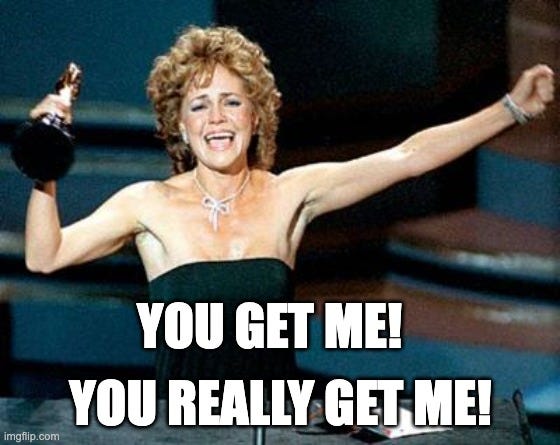Vague Bullshit
Astrology. Eastern mysticism. Continental philosophy. Psychoanalysis. Postmodernism. Quantum healing. What does all this bullshit have in common?
It’s vague. The phrases have multiple interpretations. The prose is purple, the sentences long-winded, the metaphors unwieldy. Yes, it is occasionally “deep,” but I’ve already written about “deep” bullshit. It’s time to look at its parent: vague bullshit.
The word “vague” is itself vague, so let’s make it more precise. Vagueness can be defined as the degree of uncertainty about a speaker’s intentions.
Consider the sentence: “Pass the salt.” You know what the speaker’s intentions are—they want the salt. Maybe there’s an ever-so-slight chance they’re expressing dissatisfaction with the flavorless meal—say, a 2% chance. But still, if you know with 98% certainty what they meant, the statement is not vague.
Now consider a different sentence: “There is no limit to the fullness of emptiness.” Not so clear any more, is it? Maybe the speaker feels full despite not having eaten for some reason (2% chance). Maybe they’re talking about how fulfilling it is to have nothing going on in their life (5% chance). Maybe they’re making a weird joke you don’t get (6% chance). The sentence is very very vague.
There are three implications here. First, vagueness is in the ear of the beholder. Since vagueness depends on the listener’s uncertainty about the speaker’s intentions, vagueness is subjective—it depends on what’s going on inside the listener’s head. What sounds vague to you might sound clear to me or vice versa.
Second, vagueness can apply to any behavior—not just speech. A movie can be vaguely jingoistic. A hotel lobby can be vaguely horny. When we say things like this, we mean something like: “there is a low but non-negligible chance the filmmakers were trying to glorify war,” or “it sort of seems like the hotel’s interior decorator was trying to get people in the mood for sex.”
Third, vagueness is about social intelligence—about getting inside other people’s heads as they get inside your head. Speaking clearly requires taking the other person’s perspective and anticipating how confused they’ll be by what you’re saying. People who are “articulate” are generally socially intelligent, because part of what it means to be articulate is to predict how others’ will make sense of—or fail to make sense of—your words.
Okay, now that we know what vagueness is, we can pose the more difficult question: what’s the deal with vague bullshit? Why would anyone try to communicate in a vague way—in a way they know, or suspect, will befuddle their listeners? And why would anyone listen to it, much less enjoy it?
Vague bullshit is strategic
Suppose I say something vague, like “Darwinian cynicism is the antidote to immoral morality.” Maybe you have no idea what that sentence means. Or maybe you know exactly what it means. It all depends on whether you’re a longtime reader of this blog.
What differentiates the two groups of people—the people who get what I’m saying and the people don’t? Well, the people who get what I’m saying will tend to be:
Similar. They’ll share my beliefs, perspectives, and background knowledge—the sorts of things that will help them zero in on what I meant. They’ll know the things I’m referencing and the terms I’m using.
Close. They’ll tend to know a lot about me. They’ll know the various agendas I’m pursuing. They’ll probably travel in similar circles and know (or read) similar things.
Paying attention. They’ll have to be listening to—and carefully focusing on—what I’m saying, pouring over all its possible implications. If they’re distracted by their own ruminations or by someone else who’s cooler than me, they’re less likely to get what I’m saying.
Respectful. To pay attention to me in a world of enticing distractions, they’ll have to think I’m worth paying attention to. And in homo sapiens and primates more broadly, “worth paying attention to” = “high-status.”
Wow, so the people who get me are really good for me. They’re simpatico, loyal, and culturally similar. They’re smooth collaborators who’ll be easy to get along with. They value my perspective and think I’m high-status. They’re the perfect allies.
So vague bullshit is no bullshit: it’s a clever strategy for sussing out the best social partners. It alienates outsiders while attracting likeminded sycophants. Like so many aspects of culture—jokes, disses, dog whistles—vague bullshit is a covert signal.
This implies something interesting about our psychology. It implies that struggling to put together a word salad and seeing it effortlessly understood by others should feel good. It’s a sign that we’re surrounded by the best possible people—the ones who deeply understand us. We hit the social jackpot.
The reverse is also true. If you decipher someone else’s vague bullshit—like the musings of a genius or the secrets of an insider clique—you should feel good. You’re in sync with the best and brightest. You’re in-the-know.
So vague bullshit can bind us together. If we all gather round and spout vaporous jibber-jabber, and perfectly “get” what we all mean by it, it should feel awesome, like we’re part of a special community of brothers and sisters—like we’re speaking our own secret language.
Here are some other functions of vague bullshit:
The sport of exegesis
Our species depends on language to survive, so being good at language is an important trait in a friend, mate, or leader. And part of what it means to be good at language is being good at interpreting it—at reading between the lines and connecting the dots.
So pondering vague bullshit can be a kind of linguistic game. It allows us to show off our interpretive acumen, to display how effortlessly we can extract meaning from chaos. We often enjoy the puzzle of figuring what the guru or the continental philosopher was getting at, and part of the reason we enjoy it is that it helps us practice—and show off—our hermeneutic talents.
Knowing where we stand
If you loudly proclaim something and everyone ignores you, you’re low-status. If you mutter something under your breath and everyone obsesses over what you meant, you’re high-status. So if you’re unsure about where you stand in the social hierarchy, throw out some vague bullshit and see how your audience reacts. And if you don’t know where someone else stands in the hierarchy, pay close attention when they say something vague. Observe the reactions.
Showing fealty
The more forgiving you are of a guru’s bad writing—the more you assume there is “deep” insight contained in the gibberish—the more eager you must be to defend the guru’s reputation. In the same way, the more credulous you are of someone’s bullshit advice, the more you must trust them to have your best interests at heart.
And whose reputations are we most eager to defend? Whom do we trust to have our best interests at heart? Our allies, naturally. Plus our leaders, lovers, and fellow members of the vanguard. So seeing depth in vaporous hooey—or gullibly gobbling up quackery—can be a display of fealty to our allies or submission to our leaders.
Affirming the sacred
I’ve written about sacred values in various places (see here for the blog post, here for the academic paper, and here for why happiness is a sacred value). Briefly, I think the function of sacred values is to stabilize our status games.
You see, status games are unstable, because being seen as a status-seeker lowers our status. So the only way we can all compete for status is by convincing ourselves that we’re pursuing something different from status—something selfless and “larger than ourselves”—authenticity, honor, wisdom, beauty, justice… you get the idea. If we fail to convince ourselves of our high-minded mission statement, our status game could collapse, our hierarchies could fold in on themselves, and we could lose years of accumulated status. So sacred values are a big deal, and questioning them is taboo.
Here’s where vague bullshit comes in. All too often, the intended meaning of the bullshit is: “this thing is sacred.” For example, “Knowledge is power” doesn’t mean that reading lots of books will turn you into Xi Jinping. It means: “Knowledge is sacred.” Here are some other examples:
“If a thing loves, it is infinite.” Translation: “Love is sacred.”
“The unexamined life is not worth living.” Translation: “Philosophizing is sacred.”
“Life shrinks or expands in proportion to one’s courage.” Translation: “Courage is sacred.”
So vague bullshit unites us around sacred values. It reassures us that our status games—unlike fickle fashion trends—will endure long into the future. The social ladder we’re climbing up is sturdy because nobody sees it as a social ladder. Everyone knows that everyone knows that we don’t care about petty things like status and only care about “higher” things like virtue or honor or authenticity or something.
Remember the quote I used at the beginning? “There’s no limit to the fullness of emptiness.” That’s a real quote. It comes from Osho (or Bhagwan Rajneesh), the cult leader from Wild Wild Country. What Osho means by “emptiness” is the feeling you get when you achieve a state of mindfulness—when you clear your mind of ruminations and become one with the present moment. “Emptiness” means “empty of annoying cravings and mental chatter.” So what he’s ultimately saying is: “Mindfulness is sacred.”
Charlatans, shamans, and hucksters
If you want to know how flimflam artists use vague bullshit to exploit you, here's their formula:
They study a ridiculously vague piece of information about you. Maybe it’s the random tarot card that got assigned to you, the month you were born, your "aura," the lines on your palms, etc.
They use it to discover something that is actually true about you. It’s also true of pretty much everyone. But because we normally don’t talk about the emotions we all share as social primates, we're blown away by the revelation: "Whoa, it's true! I really do want other people to respect me!"
They create the illusion that they know you better than your best friend. If we measure how much a person "gets us" by the vagueness of the information we emit multiplied by the accuracy of the inferences drawn from it, then the huckster seems off the charts in how much they get us. They must have magical powers.
The feeling of other people getting us is addictive. In an increasingly atomized world where relationships feel hollow and superficial, the feeling of someone getting us—even if it's illusory—is intoxicating.
The “getting” of inscrutable messages goes the other way too. Often, we try to infer what the charlatan meant by their mumbo jumbo, and when we arrive at a plausible interpretation, we feel good—like we truly “get” the charlatan or the spirits they’re communing with. We’re in sync with the cosmos.
Then again, vague bullshit isn’t all bad. When it makes us feel connected to other people, the feeling of connection is often correct: we really are in good company. We really are part of a special community.
Not everyone is a huckster, and not every group is a cult. It can be tremendously gratifying to stay up all night with friends spouting vague bullshit and rhapsodizing about shared values. The dance between vagueness and meaning can bring us together in a way that few things can.
So I’m not against vague bullshit necessarily. Like anything, it’s a tool that can be used for good or evil. I’m more interested in understanding it than judging it.
So the next time you want to dunk on vague bullshit like postmodernism or eastern mysticism, ask yourself whether your beliefs would seem just as vague and bullshitty to the people outside your subculture—to the people who hold different sacred values than you, who are playing different status games than you.
Maybe they’re just as confused by you as you are by them.





Nice article, but I have a very pedantic nitpick. The article should really be about ambiguity as opposed to vagueness. In general, we (i.e. philosophers of language, and I assume linguists) think of ambiguity as being about uncertainty of meaning, and vagueness as being about uncertainty regarding the state of affairs which make a statement true or false.
A question like “is there a limit to the fullness of emptiness?” is ambiguous because it’s not clear what question the speaker is trying to ask. By contrast a vague question like “how many grains of sand make a heap of sand?” is vague because it’s not clear what x amount of grains would qualify.
But notice the latter statement is non-ambiguous as it were. We know precisely what the speaker is asking, and that they want an answer of the form “x grains make a heap of sand”; we just don’t know what that x is because there are borderline cases that could constitute a heap.
But in the ambiguous example, it’s just not clear what even could satisfy the speakers question, since the meaning is indeterminate.
There is a wonderful parody of wanna be deep thinkers in the beginning of Jack Kerouac's On the Road. Characters staying up all night "discussing" philosophical ideas by throwing out lines from the books they are reading without really understanding anything. Or so I presume.